Apollo 2.0 has four major updates: complete system openness, increased security capabilities, enhanced awareness, and simulator optimization. This also means that Baidu's overall autopilot system is open, including cloud service platform, software platform, reference hardware platform and reference vehicle platform. Autonomous vehicles equipped with the Baidu Apollo 2.0 system will have the autopilot capability of a simple city road.
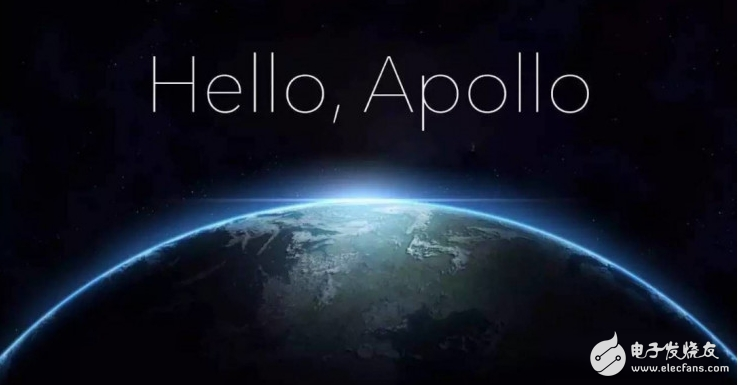
According to today's expansion speed, Baidu's "Apollo" will likely change the development of the entire autonomous driving industry.
Baidu launched the Apollo autopilot open platform in April last year. It has been more than 8 months since then. In the past 8 months, Apollo has grown from scratch to international, including more than 90 partners. It has evolved to version 2.0, from the beginning of the tracking drive to the automatic driving of simple urban roads. In the ongoing 2018 CES exhibition, Baidu also demonstrated the “China Speed†of autonomous driving through the Apollo platform.
Before that, let's review together, what has changed in the Apollo platform for more than eight months, what has changed?
Apollo was bornOn April 19, 2017, at the opening of Shanghai International Auto, Lu Qi, who had just entered the Baidu Intelligent Driving Business Group (IDG), personally announced a heavy news: officially released an automatic called "Apollo" The Driving Platform Open Program will provide an open, complete, and secure software platform to partners in the automotive industry and autonomous driving to help them quickly build their own complete autonomous driving system in conjunction with vehicle and hardware systems.
The information that was learned at the time was that Apollo plans to provide a complete set of software, hardware and service solutions, including vehicle platforms, hardware platforms, software platforms, and cloud data services. Baidu will open code or capabilities for environmental awareness, path planning, vehicle control, in-vehicle operating systems and more, and provide complete development testing tools. Baidu will also select the best cooperation partners in the fields of vehicles and sensors to form a collaborative alliance and recommend it to project participants to further reduce the research and development threshold of autonomous vehicles and promote the rapid spread of technology.
The specific timeline for Baidu's open autopilot technology is:
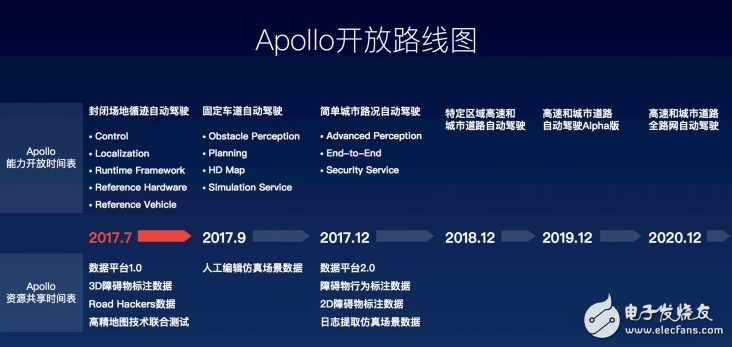
· In July 2017, it will be the first to open the auto-driving capability of closed spaces;
· The end of the year to output the automatic driving ability in the city's simple road conditions;
· Gradually open to fully automated driving on highways and ordinary urban roads by 2020.
On June 8th, 2017, in the speech of CESAsia, Gu Weiwei, general manager of Baidu Smart Vehicle Division (IV) explained Baidu's two highlights in the field of automatic driving - end-to-end autopilot model RoadHackers and Germany The BCU (BaiduCompuTIngUnit), the first mass-produced autopilot computing platform developed by Sexiwei and United Automotive Electronics, will be part of the Apollo platform's follow-up update. At that time, Gu Weijun said, "All the things I introduced (in today) are actually very rare compared to the Apollo program that we announced at the Shanghai Auto Show in April."
Apollo1.0
Three months after the announcement of Apollo's plan, the Apollo platform will release the first version as planned.
In July 2017, Baidu held the AI ​​Developers Conference. Baidu President and COO Lu Qi introduced that the Apollo project is an open, complete and secure ecosystem and architecture. It consists of four levels: cloud service layer and software platform layer. , refer to the hardware layer, reference car layer.
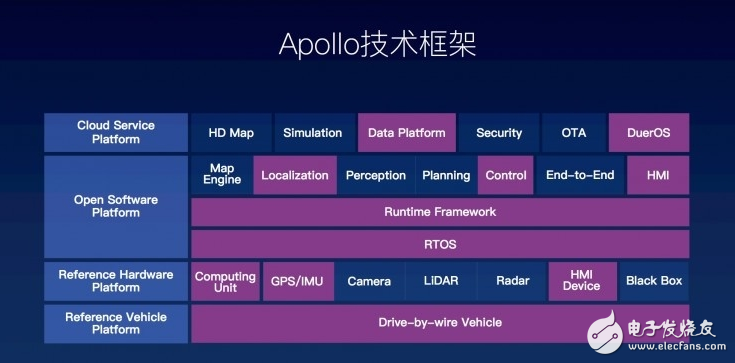
In terms of service platforms, Apollo will mainly provide developers with the following services: high-precision map services, simulation engine services, security services, and DuerOS (providing an intelligent in-car user experience for each vehicle).
Lu Qi said in his speech that Apollo plans to provide developers with a capability from 0 to 1, and any developer can form a self-driving car.
Apollo 1.0's open capabilities focus on data platform 1.0, 3D obstacle annotation data, RoadHackers data, high-precision map data and so on. Automated vehicles can achieve the driving of closed spaces.
At the scene, Baidu gave an example. The auto-driving startup AutonomouStuff had only two days to refit two self-driving cars. The two cars can be started at the same time, arrive at the same time, quickly learn and copy the driver's driving trajectory, and accurately control the action of 8 words around the pile.
At that time, Lu Qi said that Apollo will quickly open more and more capabilities, updated every week, with new versions and overall capabilities every two months or so.
In addition, when Baidu Apollo 1.0 was released, the platform has gathered 53 partners, including: 15 auto manufacturers (13 domestic auto brands and 2 overseas brands); 10 first-class TIer1 suppliers such as Bosch, China, Delphi and so on. First-class chip manufacturers including Intel and NVIDIA; map companies such as TomTom; Velodyne, Sagitar, Hesai and other laser radar companies; Horizon, Zhixing and other startups; Shouqi Car, Grab, Shenzhou UCAR and other travel service companies Tsinghua University, Tongji University and other university research institutions.
Apollo1.5
Following the rhythm of “weekly update, new version and overall capacity improvement in two monthsâ€, the operation data of the previous two months will be integrated. In September 2017, Apollo1.5 was officially released, adding 65,000 lines of code. The main focus is on the opening of five capabilities: obstacle perception, decision-making planning, cloud simulation, high-precision map service, and end-to-end deep learning. The first four capabilities are open for the first time. At the same time, Apollo 1.5 supports day and night lane-by-wheel automatic driving, which can realize obstacle recognition in nighttime environment and heterosexual obstacle recognition in atypical traffic scenes.
Obstacle perception uses point cloud data based on Velodyne 64-line laser radar. It can divide the area where the unmanned vehicle is located according to the high-precision map, thereby improving the computational efficiency, and improving the recognition accuracy through deep learning, and flexible algorithm configuration.
In the month before the release of Apollo1.5, Baidu also cooperated with Jianghuai Automobile to form the largest high-precision map collection team in China, with a production automation degree of over 90% and an accuracy of centimeter. Baidu's plan is that by 2020, its high-precision maps will cover all high-grade roads and key urban roads in the country. And these have become part of the Apollo program.
At that time, the relevant person in charge of the Baidu Apollo platform said that the 1.5 version of the simulation platform is “the only open built-in high-precision map in China, and a simulation platform tailored for autopilotâ€, which will provide simulation scenarios, algorithm uploads and scene runs. Intelligent discriminant system (helping developers to judge whether the algorithm fails or not), algorithm 3D visualization service, support for the overall algorithm and single module verification.
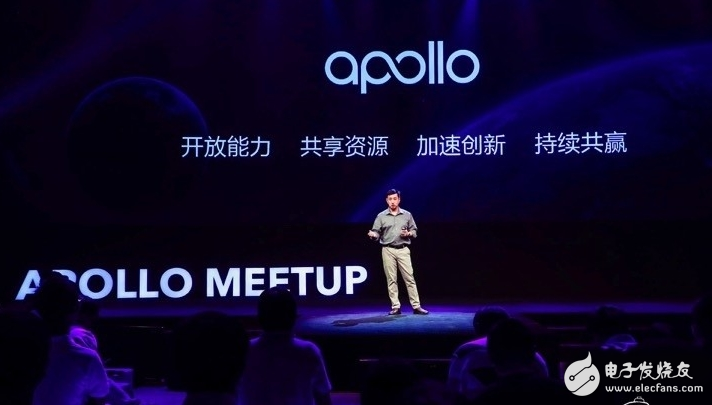
* Bai Jing Apollo platform research and development leader Wang Jingao
Compared to Apollo 1.0, Apollo 1.5 has a lidar cloud calibration, adapts to a variety of assembly options and models, and supports modular access to partner sensing and planning capabilities, with a significant overall improvement.
A month later, Baidu signed a strategic cooperation agreement with Jinlong Bus. The two parties plan to produce a small-scale unmanned micro-recycling car jointly developed in July 2018, and will be put into trial operation in the future.
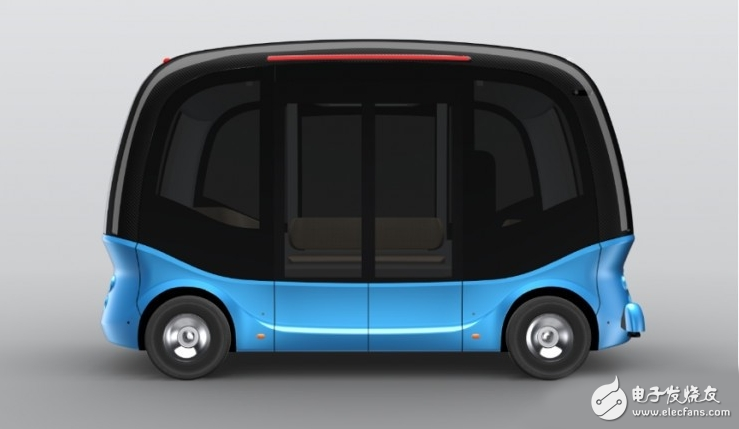
In addition to providing autopilot solutions, Baidu's Apollo platform is deeply involved in the entire process of vehicle design, including overall vehicle exterior and interior design, human-car interaction system design, specific scene requirements architecture design, and micro-cycle-specific automation. Driving system design and other aspects.
Apollo2.0
Released from Apollo 1.5, Baidu ushered in Apollo 2.0 in more than three months. This time, Lu Qi chose to push the Apollo version to the world at the CES2018 technology circle.
According to Baidu, Apollo 2.0 has the most open, complete and safe automatic driving capability. According to Wang Jingao, head of research and development of Baidu Apollo platform, this is “onegiantleapintofutureâ€.
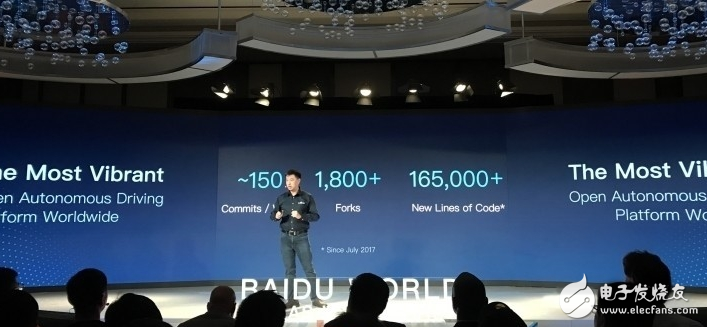
Apollo 2.0 has four major updates: complete system openness, improved security capabilities, enhanced awareness, and simulator optimization. This also means that Baidu's overall autopilot system is open, including cloud service platform, software platform, reference hardware platform and reference vehicle platform. Autonomous vehicles equipped with the Baidu Apollo 2.0 system will have the automatic driving ability of simple urban roads.
· At the security level, the Apollo 2.0 system introduces OTA upgrade security protection, hardware-level security capability and black box function, which enables the system to achieve higher defense strength under network attacks;
At the level of perception and control, the Apollo 2.0 system integrates Radar, Camera, sensor fusion, traffic light detection and obstacle type recognition, and uses centimeter-level point cloud positioning to achieve precise positioning even when the GPS signal is not good. In addition, the Apollo 2.0 system has added MPC control in terms of lane change, intersection, and avoidance functions, and the speed and body feel have been greatly improved;
· In terms of simulator optimization, ApolloSimulaTIon also completed the deployment on Microsoft Azure cloud and the new Github one-click Debug function, which is very helpful for its internationalization. Wang Jingao said that it takes 30 minutes to set up the test task on the Apollo 1.5 simulation system, which takes only 30 seconds on the optimized analog system.
Baidu said that the birth of Apollo 2.0 is the result of more than 3,900 continuous iterations, and has now been recognized by more than 8,000 developers worldwide.
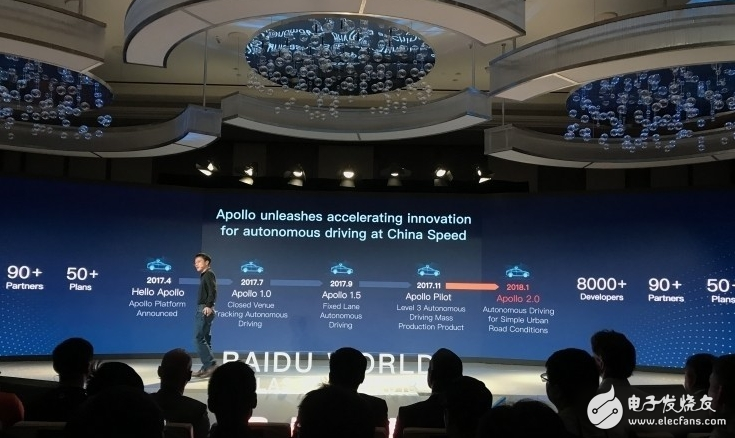
With the launch of Apollo 2.0, the number of players in Baidu's “Apollo Ecosphere†has increased a lot. The total number has reached more than 90, and more than 50 related projects are underway.
In some more specific cooperation, the Apollo platform has also made a lot of progress.
First, Apollo announced that it will fully support the four major computing platforms including NVIDIA, Intel, NXP and Renesas in 2018, and more partners will join in the future.
At the same time, Baidu officially launched ApolloPilot to accelerate cooperation with car companies and travel service providers, covering a variety of scenarios such as passenger cars, public buses and shared transportation services.
Din 41612 Connector,Din 41612 Vertical Female Connectors,Din 41612 Right Angle Plug Connectors,Din41612 Vertical Plug Press-Fit Connectors
Shenzhen Hongyian Electronics Co., Ltd. , https://www.hongyiancon.com